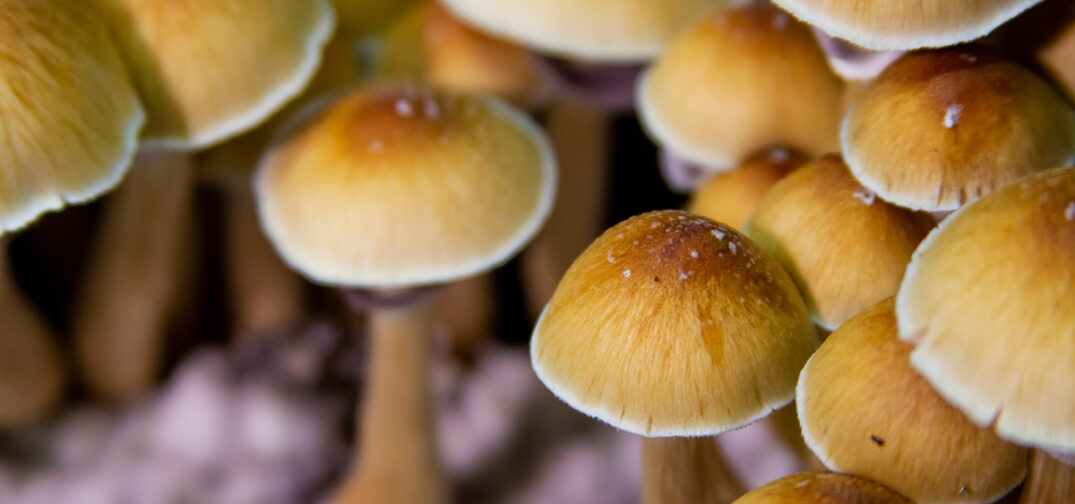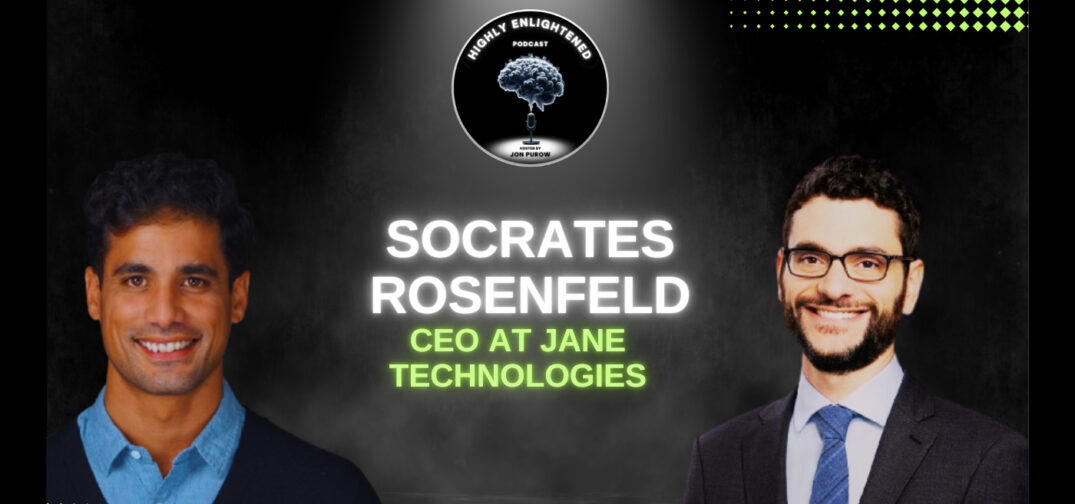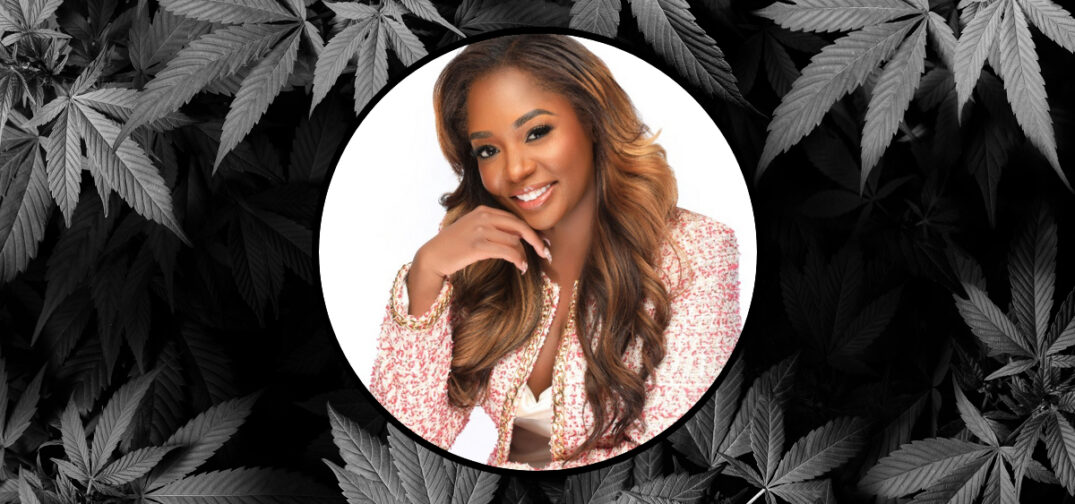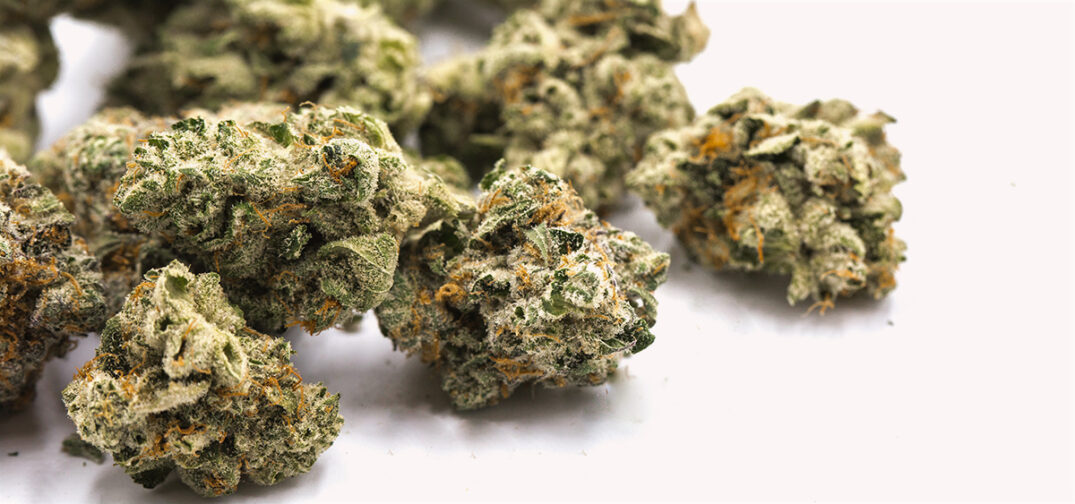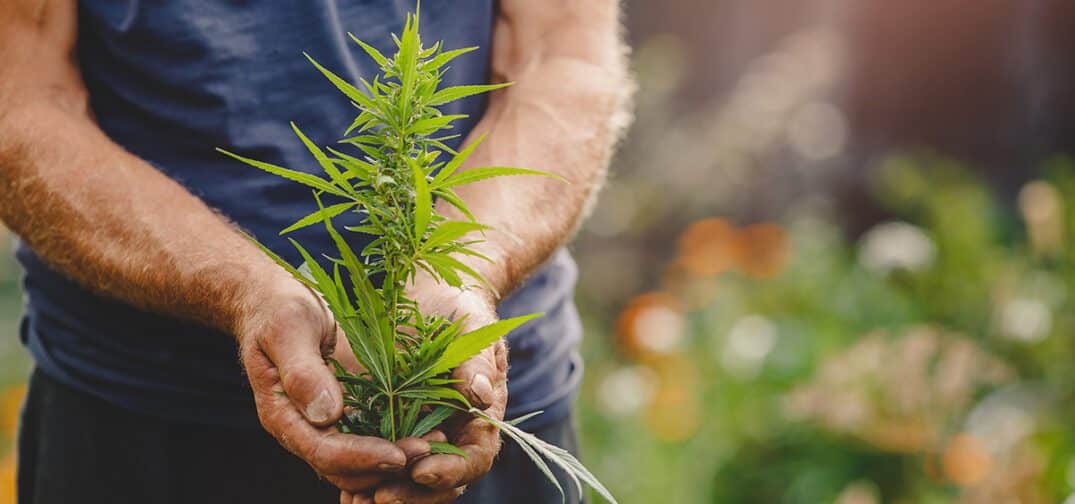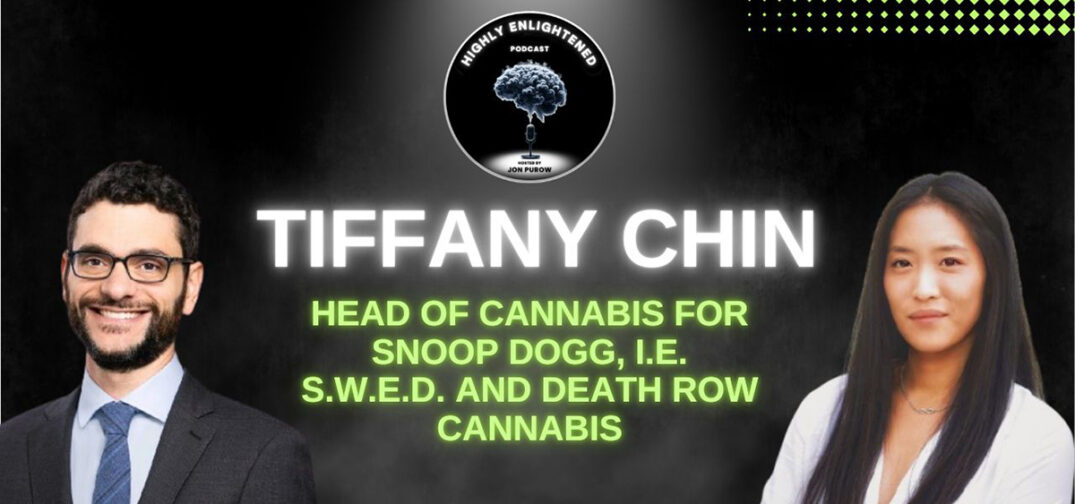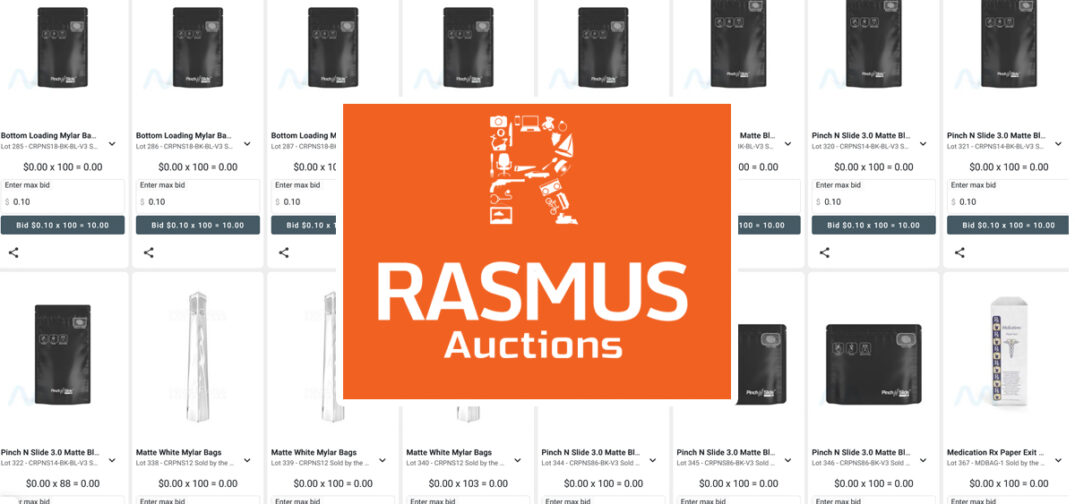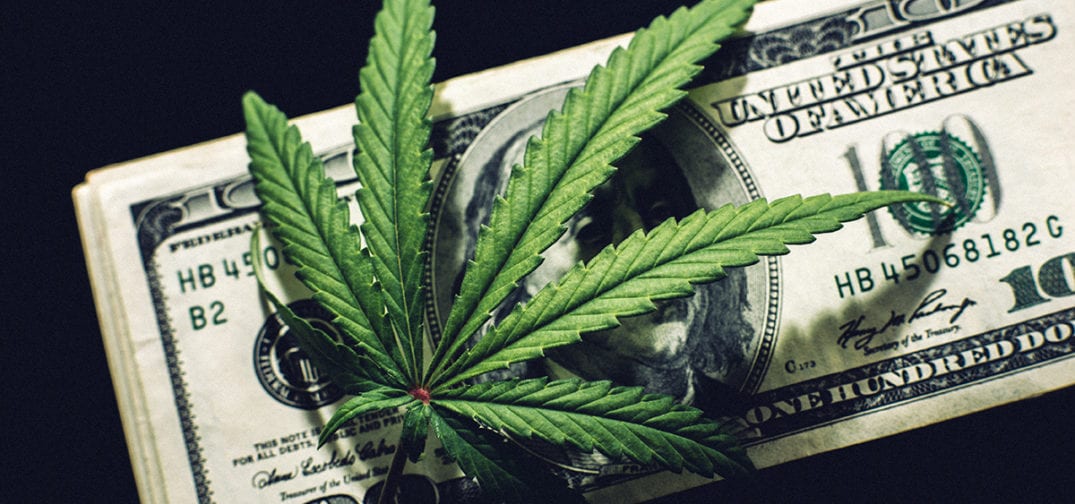In this episode of Highly Enlightened, Jon Purow is joined by Socrates Rosenfeld, the Co-Founder and CEO of Jane Technologies. A U.S. Army veteran and former Apache helicopter commander, he turned to cannabis to help re-acclimate to civilian life after leaving active duty in 2011. Frustrated by the lack of legal access in Massachusetts and the unreliable black market, he co-founded Jane Technologies with his brother Abraham to create a trusted e-commerce solution for cannabis retailers.
Since its 2017 launch, Jane has become a leading digital provider in the industry, powering over 2,500 dispensaries and brands across 39 U.S. states and Canada with e-commerce, market analytics, payments, and point-of-sale technologies. Under Socrates’ leadership, Jane has earned recognition from Forbes’ The Cannabis 42.0 (2023), Inc. Power Partner (2023), and Deloitte’s Technology Fast 500 (2022), while also being featured at major industry events like SXSW and MJBizCon. Before founding Jane, Socrates was an associate at McKinsey & Company, and he holds a degree from the United States Military Academy as well as an MBA in entrepreneurship from MIT.
Listen to the episode below or wherever you get your podcasts — you can find more episodes of Highly Enlightened on Buzzsprout.
Listen to the episode:
Episode sponsored by eBottles
This episode of Highly Enlightened is made possible by eBottles. If you’re in the cannabis business, you know that quality packaging isn’t just important—it’s essential. That’s where eBottles comes in. Whether you’re just starting out or scaling up, eBottles offers proprietary top-of-the-line packaging products built for cannabis. eBottles is a market leader for a good reason: they are experts in the field. Six patents, five warehouse locations around the country, a network of exceptional distributors. Get eBottles and Grow Boldly.
Read the transcript:
Editor’s note: this transcript was auto-generated and may contain errors.
Jon Purow:
Welcome to an interview episode of Highly Enlightened, I’m your host, Jon Purow. Now, before we get to a really exciting interview, I want to note that any opinions I express are my own. Now, before we start, I always do my quick prayer to the video chat. Gods may our wifi connections be sturdy. May all dogs and children remain quiet and may Amazon Prime another time. Now I have the pleasure of introducing Socrates Rosenfeld, the CEO of Jane Technologies. Socrates, thank you for taking the time out. I’m going to call you Soc from here on out, given me thanks for taking the time to join me on this. Oh, my pleasure, John.
Socrates Rosenfeld:
I’m looking forward to this one. So it’s a pleasure to be on, man. Thanks for having me.
Jon Purow:
Oh, really? All right. Yeah, some of these, the questions in the pre-discussion. Got you. Ready for what an incredibly serious attorney and person I am. So I assume that’s where that’s coming from. Now, this
Socrates Rosenfeld:
World’s too crowded with too many serious attorneys, man, so I appreciate you showing a little bit of humanity. It’s
Jon Purow:
Good. Yes, exactly. I always used to say when I went to law school, that was the modified Ferris Bueller quote is right. Most of the people there, you shove a lump of coal up there. You know what, two weeks later you got a diamond. Yeah, that was the law school vibe. So I fit in perfectly and that’s why my wife and I found each other amidst all those tightly wound people.
Socrates Rosenfeld:
Beautiful.
Jon Purow:
Alright, so soak, without going out into too much detail into your personal history, though, it is such a badass one when we’re talking about you flew an Apache helicopter in the military, then you decided to go full Tony Stark and went to MIT. Right. And we’re studying computer engineering there, if I am correct. Right.
Socrates Rosenfeld:
Actually, the business, I have to correct it because there are a lot of MIT grads and current students right now being like, that dude is definitely not course six, which is computer science. They say they named the course. So I was course 15, which was business, which no offense to anybody who’s course 15, it’s probably the easiest subject at MIT though it wasn’t easy for me. But yeah, I snuck in, man.
Jon Purow:
Okay, got it. You got in on the athletic scholarship, as I like to say about Brown, right? Yeah, that’s how I snuck in and blackmail. People just forget about blackmail and how useful, like you got to think Agatha Christie was onto something. So you have this ridiculously cool backstory that I’m hoping to kind of just wear off of me by osmosis, but let’s put it this way. So of all the experience and skills that you brought from your prior experience flying helicopters and everything and everything else into the cannabis industry, what do you think was the most helpful in terms of forming your view of it or in any other fashion?
Socrates Rosenfeld:
A view of cannabis or view? Just,
Jon Purow:
Yeah, just what ended up being a formative thing for how you are in the industry that you brought in from somewhere else. Right. From your issue number zero origin story, as a comic book geek, what do you think was the most helpful coming to the cannabis industry within an arrow in your quiver
Socrates Rosenfeld:
Experiencing cannabis? For myself, not taking anybody’s word for it, not listening to police officer doing his best in the DARE program or my coach or the commander at West Point or my parents. But really to experience it for myself and then to make my own decision from there, which I had never done in my life, John, or I should say rarely had done. I’d always listened to the truth as it was told to me, and I just accepted it on face value and I was essentially at my wit’s end coming out of the army, and I really didn’t know what to do. Everything that I had been doing wasn’t working for me. And what I mean by working for me was getting me back home to my heart, to myself, and I tried cannabis reluctantly for myself, and I swear from the moment I tried it and experienced it for myself, all the misinformation, all the untruths were very apparent to me.
And I was like, man, nothing that these people have told me about this plant is true. I feel good. I’m back to myself. I’m not killing brain cells. I’m not addicted to crack cocaine. I am healthy. I want to be kind to myself and everybody around me. And I thought, okay, the year was 2011 and I said, this plant being illegal can’t be illegal forever because this helps me. This is going to help too many people. And I said, okay, from that point on, I’m going to leave that door. And then five years later I started Jane with my co-founders. And yeah, so touching the truth was really the catalyst to get me going.
Jon Purow:
That’s awesome. Did you come to, so you said reluctantly, right? So my curiosity, everyone has their own personal journey to it, and that journey evolves, right? I mean, I only consider myself a medical cannabis patient when I started using it after I broke my back cliff jumping in Jamaica five months ago. And now I’m like, wait, there’s nothing else like this. And even I focus on the fact that you don’t even need the psychoactive component because a month ago we had that study coming out that said terpenes without THC beats opioids when it comes to treatment of certain pain. So did you come to it just because of that personal experience or was there any medical element to it? Was it a mental health thing? Was it like,
Socrates Rosenfeld:
Yeah, I coach Steve DeAngelo a lot. He was the early advocate, I guess in the modern age of cannabis legalization. And he says he has this beautiful saying here where we think too binary in terms of medical versus recreational. And really this plant puts you somewhere on the spectrum of wellness and wellbeing.
And I wasn’t, well, I was fit. I could run fast. I was intellectually I could take a standardized test and score relatively high. But was I well, was I present? Was I healthy? Was I soft and kind? No, I wasn’t. And so yeah, cannabis put me really on this path of thinking less about medical versus recreational. And I’m so grateful that I was 29 years old when I was introduced to this plant because back when I was 16, when normally people gravitate towards the plant or try it, I was doing that with alcohol and I just wanted to get as drunk as I possibly could, what you do at that age. But here I was at 29 and I was using it from day one as a sacrament in mature, in mature
Jon Purow:
Fashion.
Socrates Rosenfeld:
And it’s wild too because now my friends around me, my family around me who have tried cannabis earlier in their life, see me consuming and it’s changed their perspective and their relationship with the plant. Just like you have said, I imagine you consume before you had that accident in Jamaica and now that you’re consuming it, you’re realizing this is actually more of a medicine. I don’t say a medical, but a real medicine. It helps heal whatever is ailing you. And I think we cannot lose touch with that as things are becoming bigger and more mainstream. And that’s beautiful. But let’s not forget that at the end of the day for millennia human beings have been using this plant to help with wellness and wellbeing. And some might call that recreational, some might call that medical, that’s fine, but it makes you feel that’s the connection. I have the plan and I will never lose that connection. And as long as I’m at Jane, we at Jane will never lose that connection with this plan either.
Jon Purow:
Well, I mean, that was awesome. Preach it bud brother. And our Jewish ancestors appreciated that. One of my favorite things in the podcast news aggregator was popped up at a temple 2000 years ago, right? Mixed with manure. So I think they probably just did that for burning purposes. And I always think of my mother-in-law who lived on the kibbutz going up to the kibbutz and the manure smell from a mile away and her being smells like home. And I’m like, everything’s a matter of perspective. So I greatly, greatly appreciate that. I think the thing that you could probably appreciate too that hits home with me more and more is we understand a fraction of the connection to the plant. I mean, there are 625 phytocannabinoids to play with. We’ve done research in five, it’s early goings. I mean, they discovered the endocannabinoid during the war on drugs when there’s an international treaty preventing anybody from researching it. So it’s like we are scratching the tip of the iceberg. And that’s why I had this thing I put on LinkedIn where I said, I could convince you in six facts or less that there’ll be cures for cancer in the plant from one. But putting all that aside, personal wellness,
Socrates Rosenfeld:
Yes,
Jon Purow:
There’s nothing like it. And I think at some point I just realized, well one, it’s crazy how many people there are with a DHD in the industry who are very, very successful, right? Because a DHD folks find things that help them and everything. But I also just, the thing I say sometimes is if I’m going down more of a negative cycle, it puts me back in touch with my mojo, right? In my purest form, I’m dancing. That’s beautiful. I don’t see that out a lot, right? But I smoke. That’s purest form.
Socrates Rosenfeld:
You’re dancing. That’s beautiful. Bob Marley says, I think it’s cliche, I think it’s poetry. The herb will reveal yourself to you and you’re like, oh, this is me and dancing inside and that’s beautiful.
Jon Purow:
And
Socrates Rosenfeld:
I had never found myself, I thought me was Captain Rosenfeld in the army flying Apaches or MIT grad student or athlete, fill in the blank, whatever me was. But then really only you really know the real me inside there and the planet is a key. It’s not the only key. For some people it’s music. For some people it’s meditation. I have tools in my toolkit to remind myself who I am, but when used with intention, just like with anything, that medium becomes a vehicle through which you can connect back to yourself. And cannabis is a good friend in that sense. So that’s cool man in inside. That’s right.
Jon Purow:
What’s funny to me is that, well one, first of all, I just love how kind of personal this has started out and we both got to share some stuff and no, I mean I appreciate everything that you’re saying in terms of, but actually what here? So alcohol is always a comparison point. And so I found it very funny when you’re talking about how the leaf reveals who you truly are when comparing to alcohol, and we’re talking about which drug is more harmful or not, alcohol reveals your uglier parts,
Socrates Rosenfeld:
Right?
Jon Purow:
Exactly. Your doesn’t that ultimately what it does, it removes your inhibitions. So it’s not like you’re staring yourself in the mirror being like, that’s the dude. Right? It brings out the ugly parts.
Socrates Rosenfeld:
Yeah, man. I mean, I’m of the belief that we are coming back to the sense of self. We’re going to get weird enough. Sorry, my name is Socrates, so
Jon Purow:
No, please lean in,
Socrates Rosenfeld:
Man. What is John? You can describe, Hey, I’m a lawyer. I’m from here, I’m Jewish, I’m a man, all these things. But is that really you? And on some level, some might argue that, okay, we’re in this human form on some level, we are animals. I won’t refuse a really good glass of wine. I’m not dogmatic in that sense. And there’s some people who don’t touch it, and I respect that, but I really don’t drink often. But what I can recall back to the times when I got drunk, I lost my entire sense of humanity, my almost connection with my spiritual self and just became an animal that wanted to fight or the other Fs right out there. And you lose your sense of self. So I would argue it’s the opposite of cannabis. And there are some people who when they consume the plant who are heavy in drinking alcohol, it makes them uncomfortable. It actually makes them sick because the metaphor I use is they’ve been on a roller coaster for so long,
Jon Purow:
The
Socrates Rosenfeld:
Plant has you stepping off the rollercoaster. And when you’ve ever done that before, you kind of get disoriented a little bit. Man, that’s the medicine part. That’s the healing part in my opinion and in my own experience. I’m not trying to preach to anyone, but it’s interesting that you contrast that with alcohol. No one’s ever done that on a podcast I’ve been on. And here it is. It’s in movie theaters, airplanes, college games where the crowd isn’t even able to drink alcohol. It’s on every commercial. It’s a trip, man. How much we just push that onto society. And some might even argue that that’s keeping us not as awake as we potentially could be
Jon Purow:
And think a lot of
Socrates Rosenfeld:
Medicines are
Jon Purow:
Doing that. Yeah, I agree with you a hundred percent. Right. And I feel like we should never forget this country’s immaturity by comparison. So say like Europe, where they just have so much more of a mature approach to drugs, which is where I went to Spain between my junior, senior year of high school, and I got exposed to people drinking, not to binge drink, but to have a glass of wine at dinner. And they could do that if they were 18. And I just had a more mature kind of approach to alcohol as I went the first week of college and watched all the ambulances come in to pick people up from alcohol poisoning whose parents never let them try it before. So they went straight to drinking way too much and losing control. And I just think that it’s, so the way that I frankly see it, dude, is that alcohol days are numbered. Marijuana is a superior drug. I also think that people need to understand that marijuana isn’t just a single, sorry, marijuana I don’t like because it’s a racist term. High. THC, cannabis, HTC, high THC, cannabis. There you
Socrates Rosenfeld:
Go.
Jon Purow:
I’m trying to come up with something.
Socrates Rosenfeld:
I like it. I was asked by a group of executives early on because they were just kind of fact finding fishing around in the cannabis industry. And I guess I was the only dude to pick up the phone. And I was talking to them very well-known company, they sponsored the Super Bowl. They were flat out, they asked me point blank directly, do you think cannabis is a substitute or a compliment to alcohol? And without question, it was like, Hey, it’s a substitute based on, again, my own experience, the more I consume the plant, the less I gravitated towards wanting alcohol. And I think that’s consistent with a lot of people who have consumed. And immediately they said, that’s exactly what we thought. And that’s scaring us. So they’re thinking about it already. Our position,
My hope is that we don’t figuratively or literally water down the plant to, its like, Hey, this thing just gets you high just like alcohol or makes you feel a certain way just like alcohol. Because in my experience with plant medicines beyond cannabis, it won’t let you do that. And if you try to use it as an escape, a numbing agent, Hey, I want to escape from the real world. It’s going to teach you a lesson whether you like it or not. And I think we need to be very mindful of how we introduce this plant into the mainstream. I’m not saying we have to get all scientific and spiritual, but let’s not treat it just like alcohol in the sense of let’s put in a bottle, let’s pour some water into it, and then let’s literally water this down to its most non essence, right? Yeah. That’s what we’re hoping to prevent here at Jane, and we consider ourselves stewards to do that.
Jon Purow:
Yeah, I feel like, well, one, I mean I was just interviewing CEO of power supply, and we’re talking about just distillate, conceptually, just how kind disturbing it is to take something away from the way it’s intended. But let’s go back to what you’re saying there in terms of introducing people to the plant. And I always talk about kind of curious, a lot of us in the industry, I mean, you play a very large role in this, right? In terms of facilitating for people, convenience always wins. Just ask Amazon until the antitrust suit comes to fruition. But you play this role in terms of exposing people to the industry. And the one thing that just drives me nuts is I understand, look, like we already said alcohol, I consider one drug. Yes, you could get a different vibe off drinking scotch and the warmth versus a margarita, but really,
Socrates Rosenfeld:
I know you’re going this, John, and I love it, man. Yes, go.
Jon Purow:
If you know where I’m going, I’m going to appreciate it. And we need a shorthand. However, indica and sativa is bullshit, bullshit historically and everything. And yet I just want us to get to something where it’s like, alright, upper or downer mean
Socrates Rosenfeld:
Is,
Jon Purow:
And we all have different reactions, some of the
Socrates Rosenfeld:
Exactly.
So at Jane, there’s a couple of things I want to share. One is our brand design marketing team, pretty much I would argue pretty much every employee at the company has a personal relationship with the plant. I’m not saying they all consume, they’ve had a father, a mother, a friend. They understand that this is not some pill. You pop and all of a sudden you feel good. It’s plant medicine. But hopefully you’ll like this. John. A lot of people like to equate cannabis with alcohol and exactly right. There’s one dimension to alcohol. One, it’s like you drink it, you have a beer, I have a beer, okay? Our tolerance level will dictate how drunk we become, how inebriated we are. One drink. I mean, if I have a half a glass of wine, I will be tipsy. So my former Army buddies are laughing at me. Now, we say here at Jane, cannabis is more like music where if I say jazz or country or hip hop or pop, you’re like, oh, I just hate all jazz. Okay, well that’s pretty binary. Let’s listen to the actual specific song.
Jon Purow:
And
Socrates Rosenfeld:
Why I equ it to music is you use the word, it’s so personal when you listen to a Beatles song or a Led Zeppelin song, I love Led Zeppelin. Sometimes I’ll play Led Zeppelin. I turn over to someone I’m listening to and they’re like, yo, this is some scary loud music. I’m like, oh, this makes me feel peaceful or listen to a Beatles song. My wife loves it, a George Harrison song. She’s having a great day. I’m almost in tears. And so then the beautiful challenge becomes, and at Jane, and we’re not the only ones accepting this challenge, but here at Jane, we take it very seriously. How do we present cannabis to a consumer like Spotify presents music to a listener that is the art. And also, quite frankly, the science around how do you package this thing, this plant up in a way where a consumer will understand, oh, this is why you’re showing this to me.
I like bass beats in loud drums or guitar solos or quiet melodic tones. Man, can we start talking about terpenes that way one day and how it affects you personally? That’s the dream state. And I think we can get there. And you can’t do that with alcohol, bud Light, Miller Light. It’s literally all the same thing. It’s very important for us not to commoditize this plant and in fact, go the opposite direction and make this an extremely personal curated product that people can develop their own relationship with. And if Jane is a gateway into that, a threshold into that, well, that’s even more,
Jon Purow:
The podcast is proud to be sponsored by E bottles. If you’re in the cannabis business, that quality packaging isn’t just important. It’s essential. That’s where Ebos comes in, whether you’re just starting out or scaling up. Ebos offers proprietary top of the line packaging products built for cannabis bottles is the market leader for a good reason. They’re experts in the field, six patents, five warehouse locations around the country, and a network of exceptional distributors. So get ebos and grow boldly. Yeah, I mean, look, I think that ultimately we need to emulate alcohol in the sense that of product diversity. I mean, I just think that there’s going to be that easy access point as much as I don’t love distillate, conceptually, right? Stealth and health, right? Stealth and health. I get it. Well, vapes, well, putting aside heavy metal, which is in my mind the biggest secret that the industry doesn’t put out there a lot, but every study that comes back is terrifying. But I would say so, yeah, no, I appreciate all of that, but I feel like we need that product diversification. And I think that what you’re saying is, and that’s what I see the industry evolving for the cane like
Socrates Rosenfeld:
Us
Jon Purow:
Who started paying attention to their terpene profiles and get really, really specific, because I’m looking for, I don’t view it as one drug. I view it as a plant that has many roads to wellness and as a function of which one satisfies for me now, but it’s crazy to me that there could be a strain literally growing on my suburban block in South Arms New Jersey, where I like to say that the people here know how to roll literally and figuratively was a pleasant surprise when they came to the burbs. There was a strain that would just trigger high level creativity. And I’m not talking about the creativity where it’s like you go back the next morning, you look at it and you’re like, you’re just laughing. Pass the laugh test. It’s like high level creativity where other people are like, that’s a good idea. And I’m just like, A plant gave that to me. How crazy is that? And how amazing is that?
Socrates Rosenfeld:
I would even argue that the plant allowed you to find it within yourself. John,
Jon Purow:
There you go.
Socrates Rosenfeld:
Yeah,
Jon Purow:
I know. I like getting spiritual like that. You’re talking me on a great day. I had two great meditations. I had some hemp with Delta eight, and I am feeling more mindful than I felt in weeks. So you’re like, this conversation’s hitting right at the right time. So let me ask you this question. I almost feel like I want to try and answer it because I feel like we actually already know each other quite well, even though it’s been a whopping 30 minutes or so. But
I mean, the question is, what advice would you give regarding leadership to other leaders in the cannabis industry? And I’ll say, my answer is, you are authentic as possible, right? You love the plant and you are authentic as possible. And the older I get, the more I just believe in energy and how it’s contagious and how they’re positive feedback kind of cycles and stuff. And I frankly would, I’d be happy showing up to work if you were the one leading because you believe in it, right? And you are, or at least, I don’t know, you’ll be more you if I see you smoking because of what you said.
Socrates Rosenfeld:
Yeah. Yeah. I’ve come to just surrender to the fact that I can’t be anyone but myself. I can’t, can’t be somebody. I just have to be me. So I appreciate you recognizing that. And as Miles David said, it takes a lifetime to find your voice. So I’m still finding it, but I think my advice, if I’m in any position to give advice, I’m really talking to myself, is connect with your why. Connect with your, why are you doing this and to own your why. There are some people here that just see cannabis as an opportunity to make a lot of money. And you know what? Although that’s not my personal, and I’m not here to judge and say that’s good or bad, man, that’s great. Maybe that means you drive efficient businesses. Maybe that’s you build great technology, maybe that’s you make really sound strategic decisions and you can grow and provide more access to this plant.
Beautiful. But own it if you’re here because you see this as an opportunity to make your mark as a tech entrepreneur and you couldn’t really make it happen in other verticals, but here’s a blank canvas. Say it. Do it. Own it. People will follow you. The right people will follow you to do that. Where I think we could do better as an industry is the inauthenticity saying, oh, cannabis really is a medicine, but at the same time, your business practices don’t align with that. Or, Hey, we really should get people out of prison who have been wrongly incarcerated for nonviolent crimes here. But really you’re not really taking the action to go and do that type of stuff. And I’m not
Jon Purow:
Saying, is that a Biden reference in terms of letting the federal prisoners
Socrates Rosenfeld:
Out or whatever. Really just anyone who’s kind of not true and pure in their intention. And I tell you what, man, Jane has been a beautiful mirror for me because we have employees, my teammates here at Jane, they are not going to stay and continue this thing, this stuff that we do is hard, man, this John, it is challenging. It’s scary, it’s uncertain. This is just the nature of taking something from the illicit market into a legal market. You have to play in this mucky water. But the moment I stand in front of, I say, Jane is a beautiful mirror for me, really, it’s an honor to sit in the seat of CEO O because it forces me to be honest with myself, that is the only way I’m going to be able to connect with my teammates. And the only way they’re going to be able to say, yeah, I want to continue to do hard stuff with you, SOC.
Yeah, let’s continue to drive this mission forward. If I was talking out of both sides of my mouth, as we have experienced, right? Politicians, teachers, parents, you name it, we’ve all been there and it’s like, oh man, I don’t want to be here anymore. I don’t believe in this anymore. And so my respectful challenge to anybody in this space is to own your why and to be honest with your why. And there’s not a single why that is right or a single why that is wrong. But just to live in alignment with that I think is what the world needs and what this industry certainly needs.
Jon Purow:
I always say that my mother’s main legacy is that I live by the golden rule. And I think that the way that you’re describing it, the way that you’re talking it out, it is touching upon that similar concept. And I also feel like I almost finish your thought or try and articulate it in a modified way, is to get in touch with your own why and to meet people at their why. Beautiful. Because what you’re saying is what you’re saying is that, look, these are all my pop puns for some of the things that you say, I call ’em can of carpet baggers, right?
Socrates Rosenfeld:
Love it.
Jon Purow:
And I’m just like, if that’s what you’re here for, if you’re a finance bro and you’re here as long as I see you and that’s what you’re telegraphing, then that’s all good. But just don’t inauthenticity. I think our industry, perhaps because of what you said, that cannabis has been this pathway to ourselves for so many people for whom it’s so meaningful that the idea of someone being inauthentic is offensive. It is like
Socrates Rosenfeld:
It’s a great point.
Jon Purow:
I have an allergic reaction when I interact with someone in the industry who I feel is here not be. And then when you realize that everybody in the industry has a personal tie, a medical tie, a family tie. When Al Harrington told the story about his grandma in glaucoma, and I’m crying, when you find someone who’s just like, yeah, I’m here. And they’re just kind of full of shit, I’m allergic to it on another kind of level.
Jon Purow:
Yeah.
Jon Purow:
Yeah.
Socrates Rosenfeld:
Imagine that’s what makes dinner parties good or bad,
Jon Purow:
Right?
Socrates Rosenfeld:
I’m older now. I’m in my forties, and so I don’t get that money. Me too. Oh, right on you. Neither
Jon Purow:
Do
Socrates Rosenfeld:
- Yeah, plant those well for you, but I don’t care. Republican, Democrat, north, south, old, young. As long as you have a sense of self and you are being authentic, that we’re going to have a great dinner. And this is why no one likes networking events. Everybody’s got the costume on and fronting, and it’s just so exhausting and so tiring. And I think in this day and age, 2024, we’re just so over it, right? And I think we like to gravitate towards brands that are authentic. I think we like to gravitate towards people that are authentic. So why not do it? And it’s scary. It’s scary to take the mask off and it takes time. But coming back full circle, cannabis is a great friend in that sense, where it helps you take the mask off a safe way in a way that is nonjudgmental and self empathetic. And it’s a beautiful place to come from, man. And as someone who has stood in front of military soldiers trying to act a certain way, I wish I could go back and be just myself. And now at Jane, I have, I’m so grateful for the opportunity to do that because it’s an act of self. It’s a self practice, not a
Public practice. It’s really for the self. And like you said, with your meditation, only you will really know. Only you will really know.
Jon Purow:
I listen to, there’s a self-forgiveness meditation that I do. Sometimes I go way down the perfectionist rabbit hole too much. And one of the parts I love about it is, well, you’re talking about wishing you could go back and go to yourself when you were inculcated with all these different views before you tried it, and it literally opened up your mind, right? By the way, I love the fact that that’s actually what psychedelics literally do, right? Psychedelics treatment resistant depression is literally closing down neuro pathways in your brain. Neuroplasticity and psychedelics are literally opening your mind. And I think that to a certain extent, cannabis does the same thing. And I think that that’s why it’s such a good bond to have with someone. I agree with you, that networking in any sense that the inauthentic nature of it, where we’re selling, we’re all selling. I say
Socrates Rosenfeld:
It where you’re everyone beer in your hand. So it’s even compounding that, right? It’s
Jon Purow:
Like, yeah, man, it is a funny hypocrite. It’s a funny little kind of conundrum. That’s why I try to have the cannabis beverage. That’s why I was the secretary of the Cannabis Beverage Association.
Socrates Rosenfeld:
Awesome, man. Yeah. We’ve got to put more cannabis beverages in the hands of these network
Jon Purow:
Events there. I was thinking about what you were saying before in terms of where we’re trying to go. I think the cane are heading towards the micro batches and the things that are very specific and knowing their terpene profiles. But we do need for the can curious and everyone, the crossover product and cannabis beverages going to be it. And they’re already there and they’re already crossing over, and you’re referencing alcohol people calling you up and asking, you we’re already on Generation 2.0, right? We’re what, five years past the constellation deal or something? So they’re coming, right? This next farm bill, very, very interesting. Let’s see how it plays out. So wait, one thing I forgot to ask you. No, well, it was one of my silly questions. My silly. I
Socrates Rosenfeld:
Love it.
Jon Purow:
No, yeah. I’m going back to the silly question, right? So you were an actual helicopter pilot in the military, which I’m picturing in my head just for the record, as Top Gun Maverick, but with helicopters, okay? Right.
Socrates Rosenfeld:
There is a movie, actually no one knows this because it was, the Army does many things. Well, the one thing that you don’t do well, better than the Navy, the Navy’s the best at putting out military propaganda films, top Gun, Navy, seal this, all this stuff, write all the books. So the story is Top Gun came out, it’s the coolest movie. Navy submissions for applications went through the roof. So the Army saw it and was like, we can make one. So they called up Nick Cage and they made a film called Firebird. So to anybody listening, and that’s a movie that you want to watch on an international
Jon Purow:
Show, I want to watch that in
Socrates Rosenfeld:
Movie. Movie. Oh, God, it’s so bad that it’s good, man.
Jon Purow:
So Craptastic, craptastic, man. Yeah. Anyways, anyways.
Socrates Rosenfeld:
Fire Firebird. Sorry. Sorry
Jon Purow:
For distracting. No, it’s no worries, man. I mean, I get a date back to Airwolf. I found some
Socrates Rosenfeld:
That’s great.
Jon Purow:
Notebooks I had when I was in fifth grade, it was just like the front of a helicopter where literally every inch was a gun or a missile.
Socrates Rosenfeld:
Oh gosh. I know. Now it’s just parts and cannabis plants and rainbows, man.
Jon Purow:
Exactly. Exactly. So now what would you say are some of the biggest factors in terms of how Jane has reached its lofty position in the industry?
Socrates Rosenfeld:
If I were to boil it down to its essence, we create the space for special people to create. That’s what we do at Jane. We all have a why. I don’t want to, if you’re ever interviewing at Jane, that’s the only question I ask. So the secret is out, but that’s it. Like, Hey, why? And it’s like, it’s not necessarily what you say, but how you say it, right? Kind of gauge in authenticity.
Jon Purow:
So you interview like a three-year-old. Got it. Okay. Right. That phase where they’re just like, but why? But
Socrates Rosenfeld:
Why. Yeah, exactly. But to coming back to how did Jane go from where we were to where we are creating a space. And so for people to create, and if you think about that, what does it mean to create a space, create a safe space where people can be themselves. The only way from yourself can you create, if you’re being fake, you’re just going to copy, you’re going to replicate, you’re not going to do anything innovative. Do we have alignment and trust and transparency? We share and meet as a company, as a whole company every Friday. And we give updates. We share cashflow statements, we share strategy, we share wins, we share losses and learnings because without that sense of shared understanding and trust that we’re going to move in multiple different directions, and we’re a remote team. And then I think at the end of the day, we know, and I’m going to say it, and I know a lot of people throw that word around, but we love each other. Not love in the romantic sense, not loving in the fufu sense, but love of like, dang, you signed up for this ride too. It’s a
Jon Purow:
Mission,
Socrates Rosenfeld:
Right? And oh, you’re also creating space for me to make mistakes, to be myself, to be vulnerable. That’s the love. And so do we make mistakes all the time? And it starts with me. I make so many mistakes, man. But is there a space here where I feel safe, where I feel heard, where I feel seen? Can I ask for help when I need it? Can I communicate the intention and the vision at the end of the day? Can I go where it’s really hard and scary? And if I were to think back to my military days, that’s actually what it was, man. People ask me all the time, do you miss flying? Do you miss the action? I miss the InBetween. I miss knowing that time
Jon Purow:
With the team.
Socrates Rosenfeld:
Yeah, I got a bunch of other soldiers who have my back so I can go and do hard stuff. That is, and then we can get into the strategy and the product, but that’s all the other stuff. It really comes from, is there a shared understanding of each other and the mission that we are pursuing? And are we without condition? Are we here for it? And am I here for you without condition? Oh, if you’re this, then I’ll help you out. No, there’s none of that here. And that’s why in my opinion, we can stay remote and then we can continue to be successful because we have those tenants. And that is not my doing, that’s our doing. That’s every single employee, every teammate being dedicated and committed to that. And that’s when it works. In the moment it doesn’t work. One or two start going off, man, the whole thing comes off the rails real quick. And so really hiring the right people, not the best people. There are plenty of smart people in the world, but the right people, the real people, that’s who have joined the mission. And man, that’s the reason why we are where we are. It’s completely because of the people and the shared space that created for one another.
Jon Purow:
I think that that’s fascinating. So you have an all hands on deck. So help me picture this meeting in terms of how many people are on remotely and how long this meeting lasts. It gets everybody on the same page.
Socrates Rosenfeld:
Everybody on the same page, every single employee every Friday. So about 200 employees on a Zoom call for an hour. And here’s the beautiful part. A lot of people, I’m divulging secrets, interview secrets, and what goes on the curtain at Jane, we share our update, business update. Then at the end of every Friday, closeout, we call it one employee gets the mic. And for a certain amount of time, that employee shares what they are grateful for. And that’s the prompt. What are you grateful for? And it’s a wonderful exercise. And then what we do is we start, because I’m of the belief that you can’t be grateful and afraid at the same time. This tradition started during Covid when it was nuts. We didn’t know if we were going to live or die, really just to be real. We all pretend like, oh, that was so annoying. But there was a moment there where we were like, oh my God, is this it?
And so we started to share our Friday gratitude and the exercise of going through it as the individual is one thing. It’s beautiful. I love my mom, or I love my dog, or I love traveling, whatever that is. But what we come to realize too is that we are very similar in what we are grateful for. No one has said they’re really grateful for their Rolex watch or their Mercedes-Benz. We are grateful for the things that make us human, family, food, music, that type of stuff. And even though we’re remote, even though most of our employees have never met one another, the moment John, you start talking about what makes you human, connects with my humanity. And now we’re more than just employees on a zoom call. Now we’re human beings on a shared experience on the trip together. And that is how you can make beautiful things. And I’m just really grateful that we’ve created that space together here at Jane. And so that’s our Friday closeout, and that’s a tradition that I hope remains for a while. I hope it does.
Jon Purow:
I mean, I think that it’s very, very cool, right? Because think about it as a team building exercise. What more would you ideally want a team to realize that they sink on, then the things that matter most to them that they’re most grateful for? I mean, we’re all just looking for common elements, common themes. The things that I find astounding are like, no, whatever. You go to a cannabis conference, everyone’s there for one reason. They love the plant, right? It’s just like how I think I would say one of the most religious experiences of my life was going to the Yankees ticker tape parade in 1996 and seeing a million people from every background, every demographic, everything united in their belief of one thing that was a religious experience to me, I got chills watching. These people could not have been more different in certain interactions where I think that they would probably be at each other’s throats, literally just going nuts for the Yankees.
Socrates Rosenfeld:
John, I love that even though it’s a Yankees reference, and I’m from Boston, but I love that because can the cannabis industry, I would argue in the world, but let’s just focus our aperture here a little bit in the US right now, we’re so divided.
Jon Purow:
You
Socrates Rosenfeld:
Are this, I’m that, she’s this, he’s that in the industry. When we were starting in 20 15, 20 16,
Oh my god, man, that was the religious experience for me of everybody I talked to was here. Okay, some people really want to make money and they wanted to help people. Some people wanted to get people out of prison and they wanted to provide this plan for people. There was an and to it. And just like normal business, this is the capitalist game we play. There are competitors, and now it’s started to be us and them versus we. I think if we could unite as an industry, even this hemp stuff that the media’s, I was just
Jon Purow:
Going to say,
Socrates Rosenfeld:
Just us them. Can we just take a step back? We all want the same thing. We all want to put this plant into the hands of people that need it around the world. Can we just start from there? And I’m not saying we can’t disagree. I’m not saying we can’t compete, but can we just not forget about that whoever they is wins? Can we just stay tight on that and celebrate the fact that no matter what company is number one versus number two, we’re all advancing this plan, hopefully in the right way. That’s what we should be celebrating and never forget. But I’m not going to forget that story of thinking about John’s religious experience at the 1996
Jon Purow:
Yankee. Yeah, after I broke my, I mean, cliff jumping was one of my quasi spiritual experiences. That’s out. But then I would say that going to an Olivia Rodrigo concert with my daughters and watching what one person created writing in their room, turning into a thing with what, close to 20,000, mostly tween girls jumping up and down. And when I went to the bathroom, I feared for the structural integrity of Madison Square Garden, which the floor was shaking. I was in a frat party back in college. That was a religious experience for me. That was my redefined religious experience. And by the way, I find it funny that when you’re talking about all the reasons and arguments for legalization, you touched upon something that occurs to me that’s just like our world is scary and polarized and wouldn’t it just be nice if everyone just chilled out a bit, right? Because people on both sides of every single fricking aisle, we’re at 70% consistently across the country and the older demographics that are against it, they’ve been through the war on drugs for more decades. They come round as soon as they realize there’s nothing better for pain and sleep, right?
Socrates Rosenfeld:
Right. Yeah, I’m with you. It is one of the most unifying, bipartisan, whatever you want to call it. A lot of people will disagree on many issues. Cannabis legalization is not one of them. And I would argue even to take it, your spiritual guide, John, even though you like to maybe pretend that you’re not, but what’s going on around the world is someone who has fought in war. I think I have the right to say this. I remember flying in what I call my metal chariot in the sky removed from everything you talk about, the drawing, the doodles that you had on your notebook, I flew those. It was a weaponized aircraft. Here I was flying in the desert and watching people, human beings, going about their day trying to stay human, even though an Apache helicopter, a war machine was flying overhead then. And we had our cameras that you could zoom in and I’d watch, I’d fly on a certain schedule and I could see this guy in a certain neighborhood every day at the same time, walking with his kids.
And he had his wife and he was just, I didn’t know where he was going, but I remember thinking, I bet that guy and me have a lot in common. And if we could just sit down and talk about and share maybe our gratitudes, Hey, what are you grateful for? I’m grateful for my family. Me too. What else are you grateful for? Man? I’m grateful for a really nice home cooked meal. Oh man. Me too. We start to realize as much as we would love to, like, Hey, everybody should smoke some weed and chill out, man, let’s just at least get in touch with what we’re grateful for. The weed part can be icing on the cake. And at that point in time, man, we realize at the end of the day, all of us want the same things we do. And then we have been duped into thinking that the other side. So at the end of the day, we’re all human beings. And I think if we can start at Jane with Friday gratitude, maybe go out to the rest of the industry, go out to the country, go out to the world, then let’s start with gratitude and see where that takes us.
Jon Purow:
That’s awesome. I dig it. So now, here’s a question. Right now, with the role that you play in the industry, do you consider yourselves to be reactive to constant, I call it the reefer regulatory roller coaster, right? That we’re all riding the reefer roller coaster. And do you consider yourselves reactive according to the strictures of what you can and can’t do? Or do you try to be on that side of the active participants, whether you want to call it like a Steve Jobs and tell the people what they want kind of thing or not? How do you view Jane in that
Socrates Rosenfeld:
Lens? Yeah, there are natural limitations to what we are, can and cannot do. And that is defined by the law. And I love touching on this subject where there is a difference between risk and uncertainty.
In the army, anything uncertain was risky. Oh, hey, we don’t have a satellite image of this. You can’t take off. We don’t know what it is. Well, not knowing doesn’t necessarily mean it’s bad. In the army, not knowing was risk. It was guaranteed to be bad. They had to be overly conservative. Now, in the business setting, risk and uncertainty, in my opinion, should be treated differently. Risk is a known negative. Oh, okay. Hey, if you start selling weed from California and ship it into Massachusetts, that is a major risk. That is not an unknown. That’s a known A something. You’re going to be penalized. But a lot of business deals in the uncertainty. Oh, I don’t know, actually, and this is just the beauty of being in an industry that’s trying to figure out what it is.
And so we view uncertainty as neither good nor bad, but as an opportunity to learn more. And so there’s this old, I’m sorry man, that sounds so cliched, but these are the books I read. And a friend, actually, I didn’t get this in a book. This is a friend called me, he’s a zen Buddhist. Now, if he’s listening, he’s going to be smiling because he would never call himself that. But he called me and said, you know what? So not knowing is most intimate. And I had no idea what he meant. Not knowing is most intimate when you don’t know, you stay curious. I don’t know if you have kids, John, but you have kids, right? How old are your kids?
Jon Purow:
Nine and 13-year-old girls.
Socrates Rosenfeld:
Okay, nine and 13. Here we go. I love it. When they were 2, 3, 4 years old, the world was fresh when they were babies, even younger than that, just being out there, they didn’t know a bird was a bird. So when they saw a bird, they were tripping out. Or when they tasted ice cream for the first time, they weren’t like, oh, this is ice cream. They were like, my God, what is this thing? And then you start, and you’re going through it now, where they’re going from the unknown to the knowing and they’re like, oh, this is so boring. Or this is that or
Jon Purow:
This.
Socrates Rosenfeld:
We do that as humans, and you’re smiling. So I can only imagine you’re in it.
To do that in business, to be like, oh, that’s this. That’s to me that this is what’s going to happen. Wow. How limiting is that? And so what we like to do is we like to say, I don’t know. I stand in front of the company. It must drive my other teammates nuts because the CEO stands up there and is like, Hey, I don’t know how this is going to go. But if we go with the intention of, oh, this is exactly how it’s going to go. We’re going to be in a reactive state when it doesn’t happen that way. So we like to respond instead of react. We like to be in what we call in the surfing world, in the pocket of the wave. It’s going to go up, it’s going to go down, it’s going to go left, it’s going to go right.
Let’s, when we make decisions and take action, let’s think about how that’s going to set us up for the volatility. Not to say, oh, we saw the volatility. Here’s our play. We want to stay open. We want to actually not know because that’s most intimate. And if we can do that, we become less reactive and more responsive. We can start seeing opportunities and really where others might see risk, we see an uncertainty. And then slowly, slowly we have a way of getting to the uncertainty and making it known. And then from there, we can take our actions. So
Jon Purow:
Yeah. Do you have a hard stop in two minutes, by the way? Because there are two questions I want to ask
Socrates Rosenfeld:
Way, dude.
Jon Purow:
All good. Because we’re flowing too well, right? We’re flowing almost too well. It’s amazing. Now, this is just a question I like to ask, is like a dank dork, ganja geek, if you will, with the unique data that you have access to. What are some of the most surprising things that you see? What are some of the most interesting trends? What do you guys get to see that the rest of the industry would say,
Socrates Rosenfeld:
Huh? We’re starting to see different archetypes of cannabis consumers emerge, and I’m probably not telling you anything that’s groundbreaking. The one thing that I think we assume, but I’ll confirm it with data, is the number one search term on Jane is sleep.
That’s how this plant is going to enter into the mainstream, in my opinion. It’s like, man, I can’t sleep. I’m going insane. Not literally going insane. I need some help. The bottle of wine every night’s not doing it for me anymore, or this sleeping pill is making me feel literally insane. And so is there something that’s not addictive that I can use? And it’s sleep. These sleep gummies are amazing. So that’s one. But we’re starting to see the emergence of, we have folks that are really into THC that is becoming less and less of where it was five years ago. We’re now seeing people become, develop affinities towards certain brands now. Oh, I love filling the brand for vape cartridges. Oh, they just came out with an edible line. I’m going to go and buy that. I think for packaged goods, brand affinity is growing significantly. Like, oh, I like my wild gummies. That’s my gummy. I’m just going to order this. Rinse or repeat, get my auto replenishment. One day flower is music, man. Flower is like, cool, I got my brands, but ooh, let me try this strain. Or man, I’m geeking out on a brand. I’m going to give them some shine, even though I know I’m scared that they’re going to sell out. They’re called a farm cut out in, do you know them up in
Jon Purow:
No, no, no, not familiar.
Socrates Rosenfeld:
Humble. And now I want to be low. THC sun grown, so it’s cheaper to manufacture. They don’t trim it down to where they get rid of anything. So they keep the crystals, they keep the herb intact, in my opinion.
Jon Purow:
And
Socrates Rosenfeld:
Man, it sells for a quarter ounce, like 50, 60 bucks. That’s where we’re seeing people gravitate. There’s an emergence now of people like you and me, John, that are like, okay, I’m less so into, it has to be over 30% and more into, Hey, what other cannabinoids and terpenes are here? How have you grown it? What soil is this in? Similar to how we think about anything that we go put into our body. I, I’m in California, so everything is like, Hey, it’s organic or
Jon Purow:
Yeah, not being able to say organic with respect to it. Asurs is absolute ridiculous.
Socrates Rosenfeld:
Exactly, exactly. So we’re seeing now, if you asked me five years ago, every cannabis consumers probably shopping the same way, now it’s completely different. Some are store, Hey, I love my store. What do they have? Some are deal hunters, some are low, THC, high THC. Some are brand affinity. So it’s really cool. And that’s why we just come back to how do we create a platform that is personal, individual and not kind of whitewashing this plant for, hey, this is the thing for everyone on Valentine’s Day. Try this. It’s like, man, some Buzzfeed stuff. We want to develop a real tool where people can develop a relationship directly with the plant. And it’s cool now that we’re starting to see the market develop in that way, which is really exciting for us. It allows us to develop the product in our vision of where we always thought it was going to
Jon Purow:
Go. I think it’s so interesting when we have that revelation that’s like when Aaron Miles and Verano was like, I called it mature markets, and he was like, John, John, there’s no such thing as a mature market in cannabis. Even California is still significantly changing the regulations
When we remind ourselves that we’re still such early days. So for you to say now is when brand affinity really seeming to finally take hold, come up. Yeah. It’s crazy to think that, but right. I mean that’s really where we’re at. I mean, is there one brand? Maybe there’s only one brand that SA is a national brand that has national recognition and that’s crazy. And so, alright, so I always like to end. I need to get your vote. I can never decide this, right? So it’s time for you to predict the future. You’re going to play Toker dus or Smoker dus. You’re going to put on your wizard hat stylized like a J, right? And I just want you to predict something macro, micro, near future, distant future about the industry with that incredible, authentic voice of yours, my friend,
Socrates Rosenfeld:
When, but when cannabis, from a regulatory standpoint is treated as we all believe it should, on parity at a minimum, just treat it like alcohol. We all know science has proven that alcohol is a lot more destructive than cannabis. So assuming that to be true, cannabis will be an order of magnitude larger in terms of volume consumption, revenue usage than alcohol is in this day and age. I don’t know if I’ll be around to see it, but I hope that for generations, your daughter’s generation, they see it because the world I think will be a lot better off because of it. It’s a healing of the nation. So that’s my big, yeah, yeah. Tous
Jon Purow:
It. I do similar things where I talk about the scale of it. When they say, how many dispensary should there be? I said, well, how many alcohol stores are there? Right? There should be more. So with that, I’m about to turn off the recording, but I just wanted to thank you so much. I mean, what a fricking pleasure this has been, man. So you are a true, you’re part of the fam now, I like to say when you’re in the podcast. So I really appreciate it.
